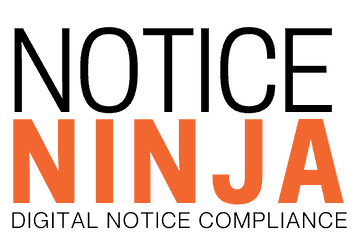Yes, NOTICENINJA is corporate tax notice compliance software that automates key workflows including notice assignments. The platform employs a rule-based system that can manage multiple level rules and ensure notices are directed to the appropriate stakeholder. As a result, you’ll never have to worry about notices being misdirected or slipping between the cracks.

How to Never Worry About PEO Tax Notices Again

10 September
Why Worry About PEO Tax Notices?
How do PEO handle tax notices? It's a question that many Professional Employer Organizations (PEOs) and their clients often ponder due to the intricate nature of tax compliance. PEOs, which simplify HR and payroll for businesses, can encounter several tax notices. Handling these notices promptly and accurately is essential to avoid legal troubles and hefty penalties.
Quick insights on how PEOs handle tax notices:
- Review the Notice: Understand the specific issue raised by the IRS or state agency.
- Gather Documentation: Collect relevant payroll records, forms, and client communications.
- Respond Promptly: Meet all deadlines to avoid additional fines.
- Recalculate and Pay: If necessary, address any tax deficiencies.
- Preventive Measures: Implement robust systems and clear communication to reduce notice occurrences.
I am Amanda Reineke, CEO and Co-founder of Notice Ninja, with experience in automating tax notice workflows. My background includes co-founding ANTS and ensuring operational smoothness and goal achievement across teams. Let's delve deeper into how PEOs manage tax notices effectively.
Understanding PEO Tax Notices
What is a PEO?
A Professional Employer Organization (PEO) is a company that helps businesses manage their HR tasks like payroll, benefits, and compliance. By partnering with a PEO, businesses can outsource these complex tasks, allowing them to focus on their core activities.
PEOs operate under a co-employment model. This means they share employment responsibilities with the client company. The PEO handles payroll and related tax filings using its own EIN (Employer Identification Number), simplifying the process for the client.
Types of Tax Notices PEOs Encounter
PEOs deal with various tax notices, each with unique implications. Let’s break down the most common ones:
941 Notice: Employment Tax Discrepancies
The IRS issues a 941 Notice when there are discrepancies in employment tax filings (Form 941). These discrepancies can stem from:
- Payroll Errors: Simple mistakes in wage calculations or tax withholdings.
- Misclassified Workers: Incorrectly labeling employees as independent contractors.
- Reporting Issues: Mishandling wage reports, like missing bonuses.
How to Respond:
1. Review the Notice: Understand the issue and what the IRS needs.
2. Gather Documentation: Collect payroll records, W-2 forms, and client communications.
3. Respond Promptly: Meet deadlines to avoid penalties.
4. Recalculate and Pay: Address any tax deficiencies.
Notice of Federal Tax Lien
A Notice of Federal Tax Lien indicates the IRS plans to seize assets due to unpaid taxes. This can severely impact a client’s operations and reputation.
How to Respond:
1. Advise the Client: Inform them about the notice and its consequences.
2. Work with the Client: Explore IRS options like payment plans.
3. Review Internal Processes: Identify areas where tax issues may have been overlooked.
State Withholding Tax Notice
Issued by state agencies, a State Withholding Tax Notice alerts PEOs to errors in state income tax withholding. Common reasons include:
- Incorrect Tax Withholding Rates: Using the wrong state rate.
- State-Specific Reporting Errors: Failing to meet state requirements.
How to Respond:
1. Review the Notice: Understand the specific error.
2. Gather Information: Collect data on employee wages and withholdings.
3. Respond to the State Agency: Provide requested information or make adjustments.
Information Request Notice
An Information Request Notice from the IRS or state agencies asks for additional documentation to verify tax filings. This can include payroll records, employee
classifications, and tax payments.
How to Respond:
1. Compile Documentation: Collect all relevant records.
2. Submit Information: Provide the requested data promptly.
PRP Liability
Potential Responsible Person (PRP) Liability notices hold individuals accountable for unpaid taxes. This can target business owners or PEO executives.
How to Respond:
1. Legal Consultation: Seek legal advice to understand personal liability.
2. Documentation: Ensure all tax payments and filings are properly documented.
By understanding these tax notices and how to respond, PEOs can maintain compliance and avoid costly penalties. Proactive communication and robust systems are key to managing these challenges effectively.
Next, we’ll explore how PEOs handle tax notices to ensure compliance and minimize risks.
How Do PEO Handle Tax Notices?
Responding to IRS Notices
When the IRS sends a tax notice, immediate action is crucial. Here's how PEOs handle it:
- Review the Notice: First, understand the exact issue. Is it a discrepancy in Form 941 or an Information Request Notice (IRS Form 4564)? Knowing the specifics helps in crafting a precise response.
- Gather Documentation: Collect all relevant documents. This includes payroll records, W-2 forms, and client agreements. Using a platform like NOTICENINJA can streamline this process by organizing all necessary paperwork.
- Respond Promptly: Delays can lead to penalties. Meet all deadlines outlined in the notice. If more time is needed, request an extension and confirm it in writing.
Managing State Tax Notices
State tax notices often involve issues with income tax withholding. Here’s how PEOs manage them:
- Understand State Regulations: Different states have unique tax laws. PEOs must stay updated on these regulations to ensure compliance.
- Review Withholding Rates: Incorrect withholding rates can trigger notices. Regularly review and adjust rates as needed.
- Use Compliance Software: Invest in software that handles multi-state payroll and tax compliance. This reduces errors and ensures timely filings.
Preventing Tax Issues
Prevention is always better than cure. PEOs can take several steps to minimize tax issues:
- Robust Payroll System: Use a reliable payroll system with built-in error checks. This helps in minimizing calculation mistakes.
- Regular Employee Classification Reviews: Misclassified workers can cause tax discrepancies. Regularly review employee statuses to ensure proper classification.
- Transparent Communication: Keep open lines of communication with clients. Educate them about potential tax liabilities and the importance of maintaining accurate financial records.
By implementing these strategies, PEOs can effectively manage tax notices, ensuring compliance and reducing risks.
At Notice Ninja, we believe that proactive strategies are the key to a smoother tax journey for PEOs and their clients. By taking a proactive approach, PEOs can ensure better compliance and enjoy greater peace of mind.
Compliance is not just about reacting to tax notices. It's about implementing best practices to prevent issues from arising in the first place. Staying updated on state regulations, investing in compliance software, and maintaining transparent communication with clients are all essential steps.
Using tools like NOTICENINJA can significantly streamline the process. Our software helps PEOs manage tax notices efficiently, reducing the risk of penalties and ensuring timely responses to any IRS or state tax inquiries. By automating many of the tasks associated with tax compliance, NOTICENINJA allows PEOs to focus on their core business activities.
Peace of mind comes from knowing that you have a robust system in place to handle tax notices. With NoticeNinja, PEOs can rest assured that they are well-equipped to manage any tax-related challenges that come their way.
For more information on how NoticeNinja can help you achieve seamless tax compliance, visit our features page.

